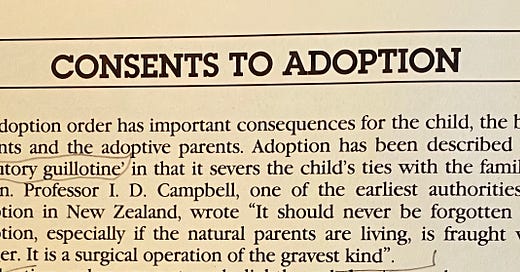What is human adoption?
Your answer may depend on your position within the adoption constellation: mother, father, adopter, legislator or bureaucrat, adoption adjacent friend or relative, or if you are one of over 100,000 adults adopted as infants in New Zealand.*
In 1997, 3.2% of New Zealand’s population was adopted. When biological and adoptive parents, siblings, aunts, uncles, etc, are included, approximately 16% of New Zealanders today have connections to human adoption.
When you think about adoption, do you imagine helping a needy child experience a loving home and, as a bonus, helping someone resolve their fertility and family-building challenges?
This win/win adoption-as-a-social-good narrative overlooks the complex social, legal, and political implications of being adopted. The idea of rescue and advantage is so entrenched in our legislation, judicial system, families, and collective social beliefs that we barely pause to question it.
A New Zealand Law Commission report noted adoption legislation reflects property and contract law principles rather than family law principles:
A secret process, elaborate precautions being taken to conceal the fact as well as the identity of the child’s natural parents and presenting the child to the world as in fact and in law born to the adoptive parents.
No matter how happy individuals are with their adoptive status, we are, as a New Zealand judge said – “a special class of persons, to whom records are denied.”
He might have said we are second-class citizens who must be controlled with separate legislation for our lifetimes and beyond. Another judge described us as: “adopted children at any age.”
Infantilised, lifelong infants - bound by an agreement in perpetuity that we did not consent to.
This attitude is so entrenched that in June 2021, the Ministry of Justice, Adoption in Aotearoa New Zealand: Discussion Document used the word “child” or “children” 782 times to describe all adopted people, no matter their age. The word “adult” was used seven times. Of these, five refer to adopters or adults who may wish to be adopted.
There is no other law like the extant 1955 Adoption Act:
No other legislation empowers the state to terminate a non-consenting person’s identity and allocate a new one.
No other legislation terminates succession rights.
No other legislation severs access to all personal records.
No other law allocates a non-consenting individual to another - as if they are property.
No other legislation prioritises the privacy rights of consenting adults over the person they have acquired - in perpetuity.
And no other legislation that enshrines non-consent.
And there is no other remaining legislation based on morality.
The artifice of adoption can only be supported by ongoing secrecy, misinformation and obfuscation.
Why can’t all adoptions dissolved on a no-fault basis (in the manner of no-fault divorce) if the adopted person chooses?
Why is an adopted person denied the right to return to their original, legal identity if they choose?
Why the ongoing systemic injustice?
Why are adopted people not entitled to the same rights as the non-adopted?
Why must all adopted people live with such profound information deficits?
Why have successive governments been unwilling to repeal this 70-year-old legislation that is so manifestly unjust?
But what about welfare?
While we will dig into this knotty question in the future, it’s worth noting that adoption is not welfare – we have other legislation to address and manage the needs of children caught in dysfunctional welfare situations.
So, what is human adoption?
Adoption is the cancellation of a person’s identity and the allocation of a new identity without their consent.
Adoption is a demand-driven industry to provide children to meet adult needs.
Adoption is a statutory process to deconstruct a person, remaking them in the image of the child the adopters could not or chose not to have.
Adoption is a uniquely performative burden.
Is it by design that society does not understand human adoption?
We need to stop and ask – would a free person choose to be adopted? Would you?
Your support keeps this work going. You won’t be charged unless you enable payments.
Next week:
But What About Open Adoption?
Coming up:
How Many Times Can You Change Your Name?
The Adult Adoption Misinformation Act – Part One






What I appreciated about this post is the language and phrases used that resonate with my feelings. You have provided me with a way to express a feeling or to name an action that I have railed against - enshrined consent issues, performativity, agreement in perpetuity, demand driven.... and designed so that it is not understood. I feel people who are not adopted cannot/will not engage as the reality is so deeply offensive if for a moment alternative narratives are considered. Thank you Barbara
The discussion of adopting in Aotearoa NZ must always be underpinned by addressing the colonisation of Maori peoples and the process imposed on them regarding forced adoptions. Utilising the term adoption is important to bring us together, however, using the term as an overarching label can ignore the layers of harm adoption has had on different sectors of peoples - I want to highlight here cultural, class, gender, and sexuality. Ignoring class, culture, gender, etc helps normalise particular voices and narratives thus ignoring how society understands human adoption only within a certain context. The abuse in care highlights this as it left out any real engagement with people who have experienced adoption thus minimalising our experiences especially those who suffered abuse at the hands of state-supported adopters